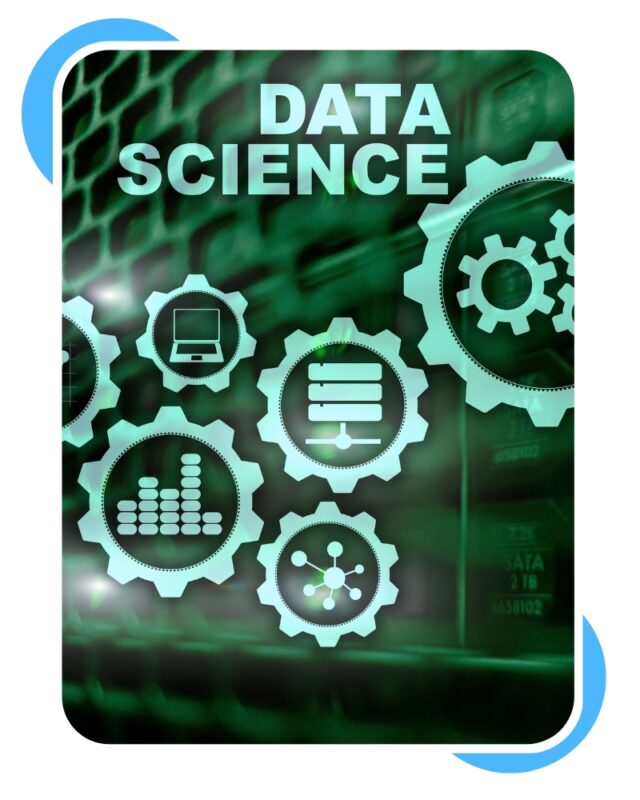
Data science is a field that involves using scientific methods, processes, algorithms, and systems to extract insights and knowledge from structured and unstructured data. It combines aspects of statistics, mathematics, computer science, and domain-specific knowledge to uncover patterns, trends, and correlations in data that can be used to drive decision-making, improve business operations, and create new products and services.

How To Learn Data Science?
There are several ways to learn data science, including online courses, university courses, boot camps, and self-study. Let’s take a closer look at each of these options:
Online courses
Online courses are a popular option for learning data science, as they offer flexibility and convenience. Many online courses are self-paced, meaning you can learn at your own pace and schedule. Some popular online learning platforms for data science include Coursera, edX, Udemy, and DataCamp.
University courses
University courses are a more structured and formal way to learn data science. Many universities offer data science courses as part of their computer science, statistics, or business programs. These courses typically cover various topics, including statistics, programming, machine learning, and data visualization.
Bootcamps
Bootcamps are intensive, short-term programs that teach students the skills to enter the data science job market. Bootcamps typically last from a few weeks to several months and offer hands-on programming, statistics, and machine learning training. Some popular data science boot camps include General Assembly, Metis, and Flatiron School.
Self-study
Self-study is a flexible and cost-effective way to learn data science, allowing you to set goals and learn at your own pace. Many resources are available for self-study, including textbooks, online tutorials, and video lectures. Some popular resources for self-study include the book “Python for Data Analysis” by Wes McKinney, the online course “Data Science Essentials” by Microsoft, and the video lecture series “Introduction to Data Science in Python” by the University of Michigan.
No matter which option you choose, practising your skills by working on real-world data science projects is essential. This will help you develop your problem-solving skills and build a portfolio of work that you can show potential employers.

Benefits of Learning Data Science
Learning data science can bring various benefits, both personally and professionally. Here are some of the key benefits of learning data science:
High demand for data scientists
Data science is one of the fastest-growing fields in the world, and there is a high demand for data scientists across industries. Learning data science can open up various job opportunities and career paths, from data analyst to machine learning engineer.
Lucrative salaries
Data scientists are in high demand and often paid well for their skills and expertise. According to Glassdoor, the median salary for a data scientist in the United States is over $113,000 annually.
Solve complex problems
Data science involves using data to solve issues and make informed decisions. By learning data science, you can develop and apply your problem-solving skills to real-world challenges.
Increase efficiency and effectiveness
Data science can help businesses and organizations become more efficient and effective by identifying areas for improvement and making data-driven decisions. By learning data science, you can help organizations streamline their operations and improve their bottom line.
Interdisciplinary skills
Data science combines skills from different fields, including statistics, computer science, and domain-specific knowledge. By learning data science, you can develop interdisciplinary skills that can be applied across industries and domains.
Stay ahead of the curve
Data science is rapidly evolving, with new technologies and techniques constantly emerging. By learning data science, you can stay ahead of the curve and keep up with the latest trends and developments in the field.
Learning data science can be a valuable investment in personal and professional development. It can open up various career opportunities, improve your problem-solving skills, and help you make data-driven decisions in your personal and professional life.

Career After Learning Data Science
There are many career paths you can pursue after learning data science. Here are some of the most common career paths in data science:
Data Analyst
A data analyst is responsible for analyzing and interpreting data to provide insights and recommendations to stakeholders. They use tools like SQL, Excel, and Tableau to clean, transform, and visualize data.
Data Scientist
A data scientist is responsible for building predictive models and machine learning algorithms to uncover patterns and insights in data. They use tools like Python, R, and TensorFlow to build models and work with large datasets.
Data Engineer
A data engineer is responsible for building and maintaining the infrastructure and systems to manage large datasets. They use tools like Hadoop, Spark, and SQL to design, build, and maintain databases and data pipelines.
Machine Learning Engineer
A machine learning engineer is responsible for building and deploying machine learning models in production. They work with tools like TensorFlow, PyTorch, and Docker to build and deploy models at scale.
Business Intelligence Analyst
A business intelligence analyst uses data to inform business decisions and strategy. They use tools like SQL, Excel, and Power BI to analyze data and create reports for stakeholders.
Data Architect
A data architect is responsible for designing and maintaining an organisation’s data architecture. They work with stakeholders to create databases and data warehouses that can scale to handle large amounts of data.
These are just a few examples of the many career paths available in data science. Other roles include data journalist, product manager, and visualization specialist. Your career path will depend on your interests, skills, and experience.

Salary After Learning Data Science in India
The salary for a data scientist in India varies depending on several factors, such as experience, skills, location, and industry. However, data science is a rapidly growing field in India, and salaries for data scientists are generally higher than many other professions.
According to Glassdoor, the average salary for a data scientist in India is around ₹900,000 annually. However, this can range from ₹500,000 per year for an entry-level data scientist to over ₹2,000,000 per year for a senior data scientist with extensive experience and skills.
In addition to salary, data scientists in India may also receive benefits such as bonuses, stock options, and health insurance. The salary and benefits package will depend on the employer and the specific job.
It’s worth noting that the demand for data scientists in India is high, particularly in IT, finance, and e-commerce. As a result, data scientists may have more negotiating power regarding salary and benefits.
Overall, data science is a lucrative field in India, and salaries for data scientists are competitive with other high-paying professions.

How to Succeed in a Data Science
To succeed in a data science career, there are several key steps you can take:
Develop foundational skills
Develop foundational skills in statistics, mathematics, and computer science. A deep understanding of these subjects will form the basis for your work in data science.
Gain experience
Gain experience with various tools and programming languages commonly used in data science, such as Python, R, SQL, and Tableau. This will enable you to work with different data sets and perform various analyses.
Build a portfolio of projects
Build a portfolio of projects that demonstrate your data science skills. This can include data visualizations, predictive models, and machine learning algorithms. Your portfolio will showcase your abilities to potential employers.
Stay up-to-date with the latest trends and techniques
Stay up-to-date with the latest trends and techniques in data science. Attend conferences, read research papers, and participate in online communities to stay informed about new developments in the field.
Develop strong communication skills
Develop strong communication skills. As a data scientist, you must be able to communicate complex analyses and insights to non-technical stakeholders. Practice presenting your findings in clear, concise language.
Seek out mentorship and networking opportunities
Seek out mentorship and networking opportunities. Connect with other data scientists, attend industry events, and find a mentor to guide and advise you as you navigate your career.
Following these steps can build a strong foundation for a successful data science career. Remember that data science is a rapidly evolving field, so continue to learn and grow as new techniques and technologies emerge.
Common Challenges in Learning Data Science
Learning data science can be challenging, even for those with a strong mathematics and computer science background. Here are some of the common challenges that learners face when studying data science:
The sheer volume of material
Data science covers many topics, including statistics, machine learning, programming, and data visualization. It can be overwhelming for learners to navigate all of this information, especially if they are new to the field.
Technical complexity
Data science involves working with large and complex data sets, which require advanced programming skills and a deep understanding of statistical analysis. These technical skills can be challenging to master, especially for those new to coding.
The constantly evolving landscape
Data science is a rapidly changing field, with new tools and techniques continually emerging. Keeping up with these changes can be challenging, and learners may need to update their skills to stay current frequently.
The need for real-world experience
Data science is not just about learning theoretical concepts; it also requires practical experience working with real-world data sets. This can be difficult to obtain for learners who are not currently working in a data-related field.
The lack of structure:
Unlike some fields, data science needs a clearly defined path for learning and career advancement. Learners may need to chart their courses and seek out resources and opportunities independently.
To overcome these challenges, learners should be prepared to invest time and effort in their studies, seek out mentorship and networking opportunities, and stay up-to-date with the latest trends and techniques in the field. They should also focus on building a solid foundation of statistics, mathematics, and programming skills, as these will form the basis for their work in data science.

Advantages and Disadvantages of Data Science
Data science has several advantages and Disadvantages , including providing insights for better decision.
Advantages of Data Science
1. Improved decision-making: Data science can provide insights that lead to better decision-making. By analyzing large data sets, data scientists can identify patterns and trends that may not be immediately apparent, helping businesses to make more informed decisions.
2. Increased efficiency: Data science can help automate many tasks that would be done manually. This can improve efficiency and reduce errors, freeing time for more critical studies.
3. Competitive advantage: Businesses utilising data science effectively can gain a competitive advantage over their rivals. By identifying trends and opportunities early on, they can stay ahead of the curve and make more informed decisions.
4. Innovation: Data science can be used to identify new opportunities for innovation and growth. Businesses can discover new product lines, markets, or business methods by analysing data and identifying patterns.
Disadvantages of Data Science
1. Ethical concerns: Data science can raise ethical concerns, particularly around data privacy and the potential for algorithm bias. Data scientists must be aware of these issues and work to address them.
2. Complex and expensive: Data science requires a significant investment in technology and infrastructure. Setting up the necessary systems and hiring the right talent can be difficult and costly.
3. Limited scope: Data science is only as good as the data it has access to. If data sets are incomplete or biased, the insights gained from the analysis may be limited or flawed.
4. Data overload: Data science can produce large volumes of data, which can be overwhelming for businesses to manage and analyze. Determining which data sets are relevant and how best to use them can be challenging.
Overall, the advantages of data science outweigh the disadvantages, but it is essential to be aware of the potential pitfalls and take steps to address them. By doing so, businesses can harness the power of data science to make more informed decisions, improve efficiency, and gain a competitive advantage.

FAQs Related to Data Science
Sure, I would be happy to help! Here are some frequently asked questions related to the Data Science:
Data science is a field that involves using statistical and computational methods to extract insights and knowledge from data. It involves collecting and analyzing large and complex data sets to uncover patterns, trends, and relationships.
Data scientists typically need a strong foundation in statistics, mathematics, and computer science, as well as expertise in programming languages such as Python or R. Other vital skills include data visualization, machine learning, and communication.
Data science can be applied to various industries, including finance, healthcare, marketing, and transportation. Any enterprise that generates large amounts of data can benefit from data science.
Machine learning is a subset of artificial intelligence that involves building models and algorithms that enable computers to learn from data. It is used to make predictions and decisions based on patterns and trends in the data.
Data mining involves extracting patterns and information from large data sets, while data science is a broader field that uses statistical and computational methods to extract insights and knowledge from data. Data science involves a more comprehensive approach to data analysis, including data mining, machine learning, and data visualization.
Some standard tools used in data science include Python, R, SQL, and Tableau. These tools are used for data cleaning, analysis, visualization, and modelling.
Some challenges in data science include managing and analyzing large and complex data sets, dealing with partial or incomplete data, and addressing ethical concerns related to data privacy and algorithmic bias.
The role of a data scientist is to analyze and interpret complex data sets, using statistical and computational methods to extract insights and knowledge. They also use machine learning and predictive modelling to make predictions and recommendations based on patterns and trends in the data. Communication and collaboration with non-technical stakeholders are also essential aspects of the role.
